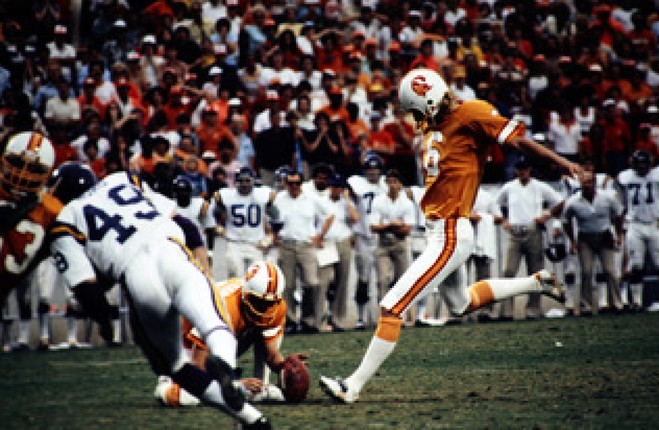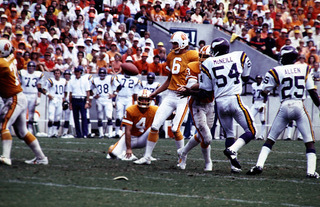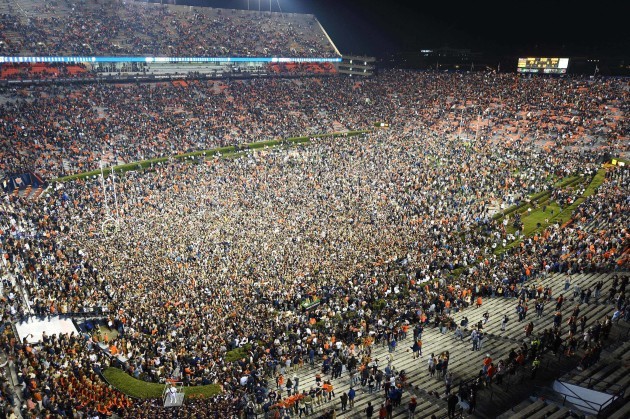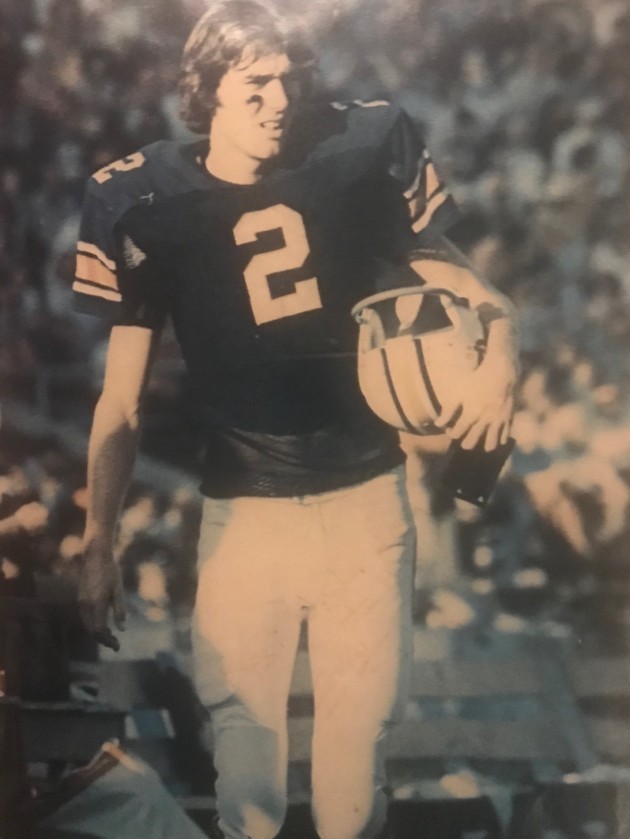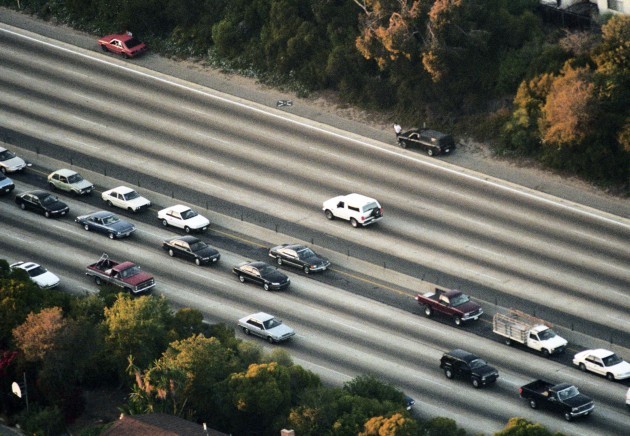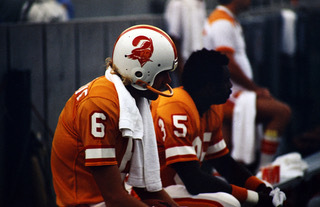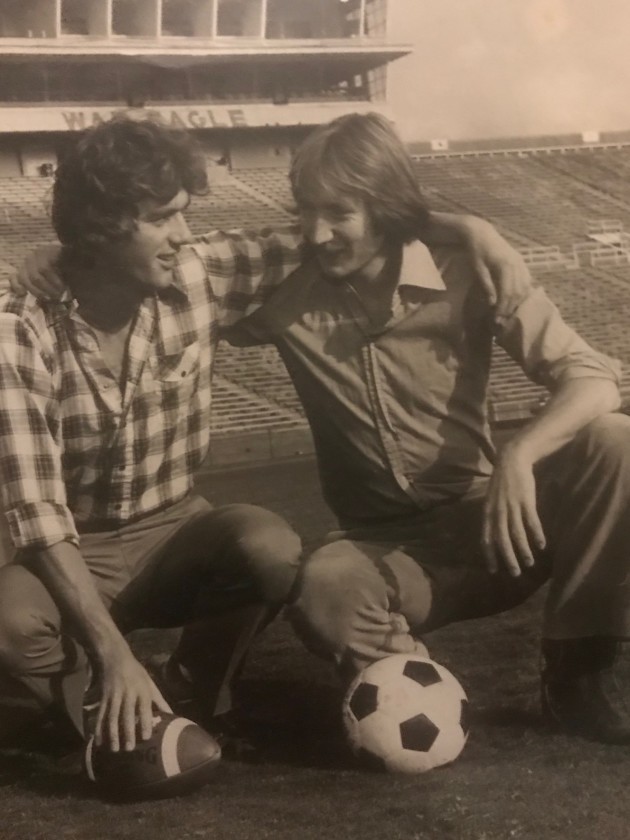HE PULLED THE pin from his grenade a split-second before a bullet ripped through his shoulder. He roared to the men behind him to take cover before facing grimly forward to a hail of fascist fire.
Shuffling forward, he limply threw the grenade forward with the shorn muscles of his damaged arm.
It didn’t fall far enough in front of him, and it was there, high in the disfigured hills of Pucciarella, north of Rome, that Lieutenant Cornelius Joseph Horgan of the Royal Inniskilling Fusiliers became the latest victim of the second world war, killed by his own grenade and a desire to save his comrades.
**********
Nine years after the death of the uncle for whom he was named, Cornelius O’Donoghue was born in Dublin.
Not that he was Cornelius for long: it had two too many syllables for the hectic hours of a sport-filled childhood.
First he was Corny, a shortening of his name loyal to a lineage stretching back to Corny Kelleher in Ulysses. So when he played Gaelic football for Round Towers and soccer on the street of his estate, he was always Corny O’Donoghue.
Later, when he was a tall and powerful centre-back playing League of Ireland soccer with Shamrock Rovers, he was Con O’Donoghue, after the great Con Martin.
When he left all of that behind to take soccer and American football scholarships in the United States he became Neil, and that’s the longest-lasting edition of his name.
Hence the last Irish-born player to play in the NFL is known as Neil O’Donoghue.
He was a kicker, first drafted by OJ Simpson’s Buffalo Bills in 1977, later going on to play with the Tampa Bay Buccaneers and the St Louis Cardinals, spending a total of nine seasons in the NFL.
“We all felt we had the world by the balls”, Neil tells The42 over the phone from his home in Florida.
“Round Towers GAA club was a huge influence as there wasn’t a whole lot else going on. There wasn’t a lot of money around, but it was a great opportunity to be around kids like yourself. No-one wanted for anything.”
The NFL should have been scouting underage Gaelic football games in Dublin.
With Towers trailing by two points in the final minute of a minor game, Neil found himself taking a sideline from the ground, about 40 yards from goal.
Coach Billy Shields told him to aim for the black spot on the crossbar; a kind of sensory map to dropping the ball around the square in the hope of a winning goal.
Neil did as instructed, and the ball bounced back off the black spot. It ended with someone kicking a useless point. “I said aim for the black spot, not fucking hit it!” came the reply from Shields.
The road to American football further wended through the sport the Americans won’t call football.
Shamrock Rovers signed Neil from Drumcondra as a 17-year-old, where he played on a team with Damien Richardson and Mick Leech.
He was talented and interested Celtic and Liverpool, but this was Dublin in 1972, where prospects were not exactly thick and abundant for everyone. Neil was working part-time as a ticket collector for CIE when he decided to swap Heuston Station for the airport, flying out to take a soccer scholarship with a (relatively) small university in Alabama.
The initial experience? “A total culture shock.”
The legacy if not legislation of Jim Crow persisted, with it made clear to African-American students that they should rarely venture outside of campus.
“I never had any prejudice, I went there with a totally open mind about everything”, recalls Neil. “As a young guy of 18 or 19, you look around and realise these people are treated differently. That was a shock to me.”
And in another extreme departure from Irish life: Neil had managed to find himself at college in a fully dry Alabama county.
Thus he and friends would pick the member of the group with the biggest car and drive 50 miles to the nearest set of flowing taps, buy quarts of beer for 50 cents and sell the ones they didn’t drink for a dollar.
The price at a different kind of pump eventually cost Neil his soccer scholarship. With the energy crisis kicking the price of gas upwards, the college cancelled the programme.
Looking once again at bare prospects, Neil’s soccer coach rang around for help and one call worked out, and Neil was approached by the American football coach at Auburn University and asked to try out as a kicker.
He had been to Auburn once before, standing among a crowd of 80,000 people for a college football match between against Alabama.
He made the journey once again, and kicked a series of placed balls from different spots on the field as coach Ralph Jordan – who served in North Africa and Italy during World War II – looked down from his office.
Neil got the gig.
“I probably played in the third game I ever saw.
“[Auburn/Alabama] was the only game I saw, and I maybe saw a couple of games on TV, and then all of a sudden I found myself walking onto the field with 80,000 people and I’m thinking, ‘Huh, it’s a little different here.”
So as he foostered about for familiarity with a game that tens of thousands of people expected him to have already mastered, was he really thinking about the NFL? Surely this was a see-where-far-this-takes-me kind of agreement with himself?
“When you’re in a situation, and thinking, ‘What am I going to do?’ you think maybe I can make a career out of that. For anyone else, they said, ‘What the fuck, are you crazy? That ain’t going to happen’, but for me, I thought I might be able to do this.”
Within two years, he made All-American (a kind of All-Stars for college football) and was a fifth-round draft pick for the Buffalo Bills.
So how, exactly, did he manage to adapt to and thrive within another sport so quickly?
**********
“To know Neil you need to know my Dad”, says Coli O’Donoghue across a cup of coffee in his Dublin office. Coli is 18 months older than his only sibling and eschewed his own promising sports career to be an architect.
(Not that he hasn’t left his own mark on Irish sport: he was one of the architects involved in designing the redeveloped Croke Park.)
Mick O’Donoghue was born in Cork but raised in Spiddal in Connemara, where he spoke Irish and played hurling. His Fíor-Ghael credentials were strong, then, when he moved to Dublin to take a job with CIE, then still known as Great Southern Railways.
He played club hurling in Dublin, but the main sports on offer through his employers’ sports division Railway Union were enough to make the Gael break out in a cold sweat: cricket and hockey.
When a flu outbreak left the Railway Union hockey team depleted ahead of a game, Mick eventually gave in to his proselytising of his colleagues and agreed to play.
Within two years he was full-back for the Irish hockey team, from which he didn’t budge for a decade and won a triple crown, hurling away around the vacant fringes of the weekend.
Later in life, Mick told Coli that his finest sporting achievement wasn’t made between any white lines: it was his becoming the first Catholic president of the Irish Hockey Union in 1949.
“It showed his ability to move in strange circles”, says Coli.
Perhaps the root of Mick’s versatility was a healthy agnosticism toward sacred cows. His international hockey exploits were not undetected by the GAA’s Vigilance Committee and thus he was hauled before a three-person GAA panel on O’Connell Street, charged with contravening Rule 27, the ban on playing foreign sports.
Mick arrived and sat in front of the panel, and was asked to respond to the charge. He admitted in Irish that, yes, he was playing field hockey for Ireland in an international match against Scotland. The trio in front of him had the confession they sought, but they had one slight problem: they couldn’t understand a word of it.
They asked Mick to speak in English, which he refused by saying, “If I have to be tried, I want to be tried in Irish.”
The case was dismissed, and the story made a national newspaper beneath the headline, “The Three Wise Nationalist Men.”
Not that this drove Mick from the GAA. By the time he moved into Clondalkin with his wife Mary in 1950, he busied himself by taking part in the resurrection of Round Towers.
“Dad was a great sports administrator”, says Coli, “and he rebuilt Towers in the 50s. He might have had selfish needs when I look at it now: he had two sons and probably wanted an outlet for them to play.”
Mick became a coach too, and Coli testifies that his Dad was happily estranged from the pushy parent, preferring understated encouragement.
Our neighbours would come in after mass as Mum could make good coffee, and in the ’60s, this was slightly unusual. We had a little bit of a lawn outside and one morning I remember Neil coming in and saying, ‘I was able to do 50-plus keepie-uppies.’
“‘What foot did you do it with? Your right foot? When you can do it with your left foot I’ll come out and watch you.’
“So Neil went at it for six weeks, Dad was called out, and Neil had to be told to stop at 120.”
“He was the influence in my sports career”, says Neil.
Mick would rarely miss either of sons’ matches, although clashes meant privileging the more important event. He died too young, when Neil was 15 and Coli 16-and-a-half. Arriving home on a mid-afternoon from a Gaelic football semi-final in which Neil played, Mick complained of being tired and his wife told him to go to bed and rest, and that she would send up a bowl of soup.
Neil arrived into the bedroom soon after holding the soup, just as his father was having a heart attack.
“I’m absolutely certain that had an impact on Neil”, says Coli. “Because of the relationship, the mentoring; the sports thing was huge for them. At the time, everyone spoke of Neil as the one who would make it, whatever ‘make it’ was. There was talk of Celtic, Liverpool, a lot of people looking to do trials.
“My mother was adamant that he would go to college and get a degree. Play your football, but education was the big thing for her. Probably less so for Dad, he could see Neil had a chance of making a living out of this thing.
“That was a really big blow at that age.”
Coli went to Alabama before his brother, spending the summer of 1970 there on a J1 visa. He played soccer at the weekend, and was then asked if he’d like to hang around and take a soccer scholarship at a (relatively) small college called St Bernard. When Coli declined as he was studying architecture in Ireland, they asked if he knew of anyone else who might be interested.
Coli said there were at least five kids on his street that were better footballers than him, and that his brother was the best of them all. Months later, a delegation from the college landed in Dublin airport looking for his brother’s name on a dotted line. Initially resistant, Neil eventually gave in to the offer of a free holiday to check the place out.
“Mum went back to work as a nurse”, says Neil, “and I had the opportunity to take a little burden off of her by coming over here. All in all, this was an opportunity.”
Almost 50 years on, he’s still there.
**********
Things didn’t go well at the Bills, and he was cut after just five games. The Bills were amid a seemingly endless run of defeats, and Neil struggled to adapt to the truculent cold of upstate New York. He also didn’t have a whole lot of time to adapt, having missed pre-season as his agent insisted he hold out and haggle for more money.
“They were on a six, seven, eight-game losing streak, so when things are going bad, the kicker is the easy guy to get rid of”, says Neil.
“If you get rid of a QB or a running back, they gotta learn the plays. The kicker just has to come in and kick the football, so you’re an easy target to take the pressure off them when they ain’t doing very well.”
There is one part of his brief time in Buffalo that’s worth lingering on, mind: OJ.
“You walk in there and you’re dealing with an icon.
He was the man. He was probably the best running back, other than Jim Brown, to that point. He was one of the few guys to come up to me and say, ‘Welcome Neil, we need you and we’re going to make you a top kicker here’, all that sort of shit. But he was living in a different league than I was. He was a superstar. He was a nice guy but he had a big ego. Everyone had treated him differently since he was 10 years old and playing peewee football. He was the guy, so everyone catered to him.
“What I knew of him he was a nice guy that basically had the world by the balls. He could do anything, go anywhere. What Juice wanted, Juice got.
“He ran the locker room, he had his own speakers in there to play his music, but it was cool. You’re sitting a couple of lockers away from OJ Simpson, thinking, ‘Okay, this is the tops, and I’m just trying to hang in there’ but all in all, when you’re playing with OJ Simpson and he comes up and shakes your hand you realise, ‘Right, this is a different world now.’”
Like the rest of the country, Neil turned on the television in 1994 to watch OJ drive down the San Diego freeway. “I can still see that Bronco.
“Was I surprised? Absolutely. Do I think he did it? Absolutely. I think the evidence was there at the time, but I think he got a pass because of the riots in LA at that time. It was kind of like a payback verdict.”
Cut by the Bills, Neil was seemingly left to watch OJ on television like the rest of us.
“I was thinking, ‘What the hell am I going to do?’, but you have to hang in there and keep going.”
Another opportunity arose, and he signed with the Tampa Bay Buccaneers in 1978. He spent two years there, the second in which he kicked a 19-yard field goal to send Tampa Bay to the NFC Championship game, one step from the Super Bowl. They didn’t make it, losing 9-0 to the LA Rams.
He was cut at the end of the year.
By this point, Neil was becoming familiar if never fully inured to the pressure of the NFL, and the uniquely Manichean existence as a kicker. Irish newspaper reports of the time spoke with wonder at a kicker’s hourly rate, but few kicks made for even fewer shots at redemption.
“A lot of guys in the league were used to that”, says Neil. “They grew up with that. Me, before I played in the NFL, I think I probably kicked in 18 or 20 games. I didn’t know what it was all about until I got there.
“I understand the pressures of the game better now than I did when I was playing. You go out next Sunday and kick two or three field goals, ‘Hey, you did great’.
“But you go out and miss a couple, and it’s going to be a bad week. You have to learn to deal with that, and that took me time.”
Coli reveals another type of pressure: gamblers would frequently phone Neil and offer him money to miss kicks. All offers were swiftly rejected. “The pressure of professional sports in America is they love winners”, says Coli. “Everything is about winners, there’s no such thing as a draw.”
Cut from Tampa, it was time for Neil to start hanging in there again.
He ended up working on building sites in Florida, and he was on the 12th floor of a Condo when his wife rang to say the St Louis Cardinals had been in touch.
Neil was in Missouri the next morning, for a kicking competition with incumbent Steve Little. The winner got a job.
Steve Little was a rare thing in the NFL: a kicker and a first-round draft pick, but things weren’t working out, and Neil won the competition.
Afterward, Steve congratulated him and offered to take him out that night, to show him a couple of the spots around town. Neil declined, saying he needed to be up early for practice to blow away cobwebs ahead of the weekend’s game with the Redskins.
“They put me in a hotel in St Louis. I’m up for practice the next morning at seven o’clock and I turn on the TV and there’s a tremendous wreck.
It was Steve. Steve wrapped his car around a pole. Paralysed from the neck down. At that point, I knew the reason for this was the pressure of the NFL. The kid lost his job, and he needed to get fucked up. The next morning, his whole life changed. At that point, I was thinking, ‘God, can I keep on doing this? This is what it does to you. I’d been cut twice and I knew the feeling. It’s not a good feeling, ‘Hey, you’re a failure’. He ended up dying about 10 or 15 years later. He lost his wife, lost everything. This kid I replaced, I remember him as a good person. Had I gone out that night, would I have been part of that tragedy? For Steve, it was the pressure of not getting the job done and finally getting out of that bubble, and he just had a few drinks too many to release it. He thought he needed to get fucked up and then go back home and start all over again.
“There was a little bit of guilt, but it was mostly, ‘This is the game. This is what it does to you. Is it worth it?’”
Neil ended up doing six years with St. Louis. For the first time, he had the unflinching confidence of his coach, Jim Hanifan, which helped ease some of the pressure. It wasn’t entirely plain-sailing, however, and, as is the condition of most NFL kickers, he is best remembered for a miss.
The 1984 regular season was Neil’s best to date and to crown it with a place in the play-offs, the Cardinals had to beat the Redskins in the final game of the regular season. Trailing 29-27 as the seconds ticked down in the final quarter, Neil was summoned from the bench in a panic to kick a field goal to win the game.
He missed it.
“The coach made a balls of it on the line”, says an animated Coli.
“Time was running out, he should have called a time-out and got a new set-up on the field. But he didn’t stop the clock, so there was like 10 seconds left.
“The ball comes back like this [gestures to show the ball lying at a difficult angle] and he kicked through it and missed.”
Neil eventually called it quits a year later, with years of back niggles catching up with him.
Deadspin cruelly tagged him as the 17th-worst player in the history of the NFL: damn the kicker’s conspicuous plight.
“Could I have done better? Yeah.
“But you know what? I did it, and not a lot of guys can say they did it. I did it sometimes as a matter of survival, to keep doing this as long as I could. Maybe get three years out of it, or maybe you’ll get five, or maybe you’ll get eight.
“I ended up with nine, and as far as the overall picture goes, I think I had a successful career.
“I see a lot of guys in the league now, great kickers with a great pedigree in college, and they last two years and then you never hear about them again.
“Where did they go? Did they decide to quit? That wasn’t an option for me until the end, when I had my back problems and I couldn’t do it anymore.”
So where did this career-forging perseverance and attitude come from?
“When you’re down you just gotta keep going, grab the bull by the horns and keep on going. We got all that from our parents.”
*********
It wasn’t until a lady with a grand English accent turned up at their door that the brothers learned the full story of their mother’s earlier life.
“Your mother saved my life.”
Mary Horgan trained as a nurse on Jervis Street and then moved to London for work under the encouragement of her brother Cornelius shortly before the outbreak of the second world war. Cornelius signed up for the fight and Mary followed, joining a front-line nursing group called the Queen Alexanders.
She tended to the wounded on the battlegrounds of France, travelling south and then across the Mediterranean to North Africa. While in convoy across the sea, Mary’s ship was blasted asunder by a torpedo, and she survived by grasping onto a piece of floating debris in the sea. She hoisted an English lady onto the debris with her, making sure she clung on and kept her head above water.
There they resolutely floated for 18 hours, and were eventually rescued.
She continued on to North Africa and later went to the south of Italy, with a plan to meet her brother Cornelius in Rome. He never made it.
“She never wanted to talk about it”, says Coli of his mother’s experience of war.
She moved to Florida – where Neil now lives – to continue work as a nurse and applied for American citizenship. Needing to be out of the country to apply, she hopped down to Cuba to work there for a while. It was there that she took a phone call from home telling her of her father’s death.
She returned home, and while there she reconnected with Mick O’Donghue, whom she had actually met before the war. As an Irish international hockey player, he was dispatched to coach her side, Bohemians.
Mary Horgan never did make it back to America. Instead, she became Mary O’Donoghue in 1950 and had two children: Coli in ’51 and Neill arrived in ’53.
“We never wanted for anything”, remembers Neil. “My mother could make a meal out of nothing, there was always food on the table, always kids to play with, and the doors were always open. You could stop in anywhere, everyone had three or four kids, and it made for a great upbringing.”
“We were lucky in that our parents were super”, says Coli. “Mum had that grit, and that was demonstrated in the capacity to be in those difficult places and survive. To survive mentally, as much as anything else.”
*********
After the NFL, Neil got into real estate and then sold insurance, before the travel with the latter job became too much with a family at home. Thus he has been selling cars for the last 25 years.
“I work at a dealership five minutes from where I live, I live in a nice neighbourhood. I got a decent pension out of the NFL, so it all worked out and I moved on.”
He does say that he may have had a better shot at a soccer career in England if he had the coaching standards of today, while Coli reckons he could have been a fabulous rugby player, specifically at number eight.
To prove the point, Coli had his brother play a couple of games with his Palmerstown team back in the day, although insulated him from potential injury by playing him at full-back.
The brothers remain extremely close. “He’s a fascinating guy and has had a hell of a career”, says Neil of Coli.
“I’d look to him as my hero. If I ever have problems, he’s the first guy I call.”
Neil makes it back to Ireland a few times a year, and although he complains about the creeping price of a pint, “I’m still drinking it.”
Last year the brothers went out for lunch with a couple of friends from the estate in Clondalkin and had a pint in – where else – O’Donoghue’s. John Giles was at the other end of the bar, and were introduced when the barman made an errant connection when he learned Neil had played football.
It worked out well nonetheless. Sometimes, says Coli, it’s okay to meet your heroes, perhaps unaware that Neil had already spent the afternoon with his.
The career of the last Irish-born player to play in the NFL is a ballad to a better kind of family inheritance; a life that made vivid through sport the virtues and values forged by his family across the world and further fortified on a Clondalkin housing estate in mid-century Dublin.
These family values will live on. Neil’s son was christened Neil, too, although Junior has since decided to change his name.
He’s in the movie business now, you should look him up: his name is Cornelius O’Donoghue.
